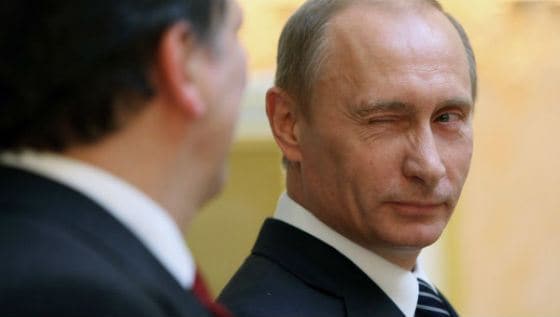In the assumption that even Putin cannot reign forever there have been attempts to handicap who is most likely to succeed Putin as Russia's president in 2024ץ when Putin will again be constitutionally ineligible to run for president:

(Source: Uznayvse.ru)
2024 Russian Presidential Election Candidates
The St. Petersburg Policy Foundation has published a paper, titled "Successors' rating," presenting the 20 most likely successors to Russian President Vladimir Putin.[1] The fund states that the report is an "educated" guess about Putin's successors in the 2024 presidential elections, since the results of 2018 elections are a foregone conclusion. The foundation specified that the report includes a list of people, who most often figured in the hands of hypothetical successors, or who most actively claimed this role.
The hypothetical successors were rated according to five criteria: publicity (their degree of presence amongst recognizable media figures), expectations (for promotion and advancement of elites and experts), current activity (as a mark of ambition and a sign of approval by the top leadership), non-conflict, and subjective weakness (making him less of a threat to other competitors, each of which was then graded on a five-point scale.
According to the report, the following are Putin's possible successors in the 2024 Russian presidential elections:
-
Dmitry Medvedev, Russian Prime-Minister
-
Sergey Sobyanin, Mayor of Moscow
-
Alexey Dumin, governor of Tula district (Putin's former personal bodyguard)
-
Sergey Shoigu, Minister of Defense
-
Valentina Matvienko, Federation Council Speaker
-
Alexey Kudrin, the former finance minister
SUPPORT OUR WORK

-
Sergey Kirienko, former prime-minister, currently first deputy of presidential administration
-
Anton Vaino, head of the presidential administration
-
Vyacheslav Volodin, the Duma Speaker
-
Igor Sechin, head of Rosneft corporation
Ramzan Kadyrov, the president of Chechnya holds the 13th position, while Alexey Navalny places 18th.
Who Will Be Prime Minister After The 2018 Presidential Elections?
Alexey Venediktov, editor in chief of the Echo Of Moscow radio station, rated those most likely to be appointed prime minister following the 2018 elections, taking for granted that Putin will continue on as Russia's president. On August 15, 2017, Venediktov predicted in his Telegram Channel account, AAVST,[2] that Denis Manturov, the Minister of Trade and Industry, and a young technocrat, who is backed by one or more influential groups like Rosneft or Rostech, would take the "bronze" in the current run for the premiership.
The silver medal, would go instead to Yuri Trutnev, deputy prime-minister, who is well connected to the so called "Old Putinists," but is not part of them himself. He may also be supported by the regional elites as well as by an "economic bloc," headed by former finance minister Kudrin, to become the new Russian Prime Minister.
According to Venediktov, the gold medal goes again to Dmitry Medvedev, since he is suitable for the fragile current and future balance of power, so all groups can accept him as a compromise figure.[3]
Whose Positions Are Likely To Weaken After The 2018 Elections?
Minchenko Consulting Company, with reputedly close ties to the Kremlin, published a yearly report on prospects for the inner circle of Kremlin heavyweights. According to this assessment, the positions of Igor Sechin, head of Rosneft corporation, Vyacheslav Volodin, Speaker of the Duma, and Arkady Rotenberg, an influential businessmen and Putin's personal friend, are likely to erode after the 2018 elections.
In contrast, Dmitry Medvedev's position will most likely remain unchanged. According to the assessment Medvedev has three options available after the elections: "He proved his loyalty to Putin on numerous occasions while he's mastering the aikido stratagem - to weaken yourself in order to preserve yourself. His three employment options are: to retain the prime-minister's chair, to move to Gazprom corporation, thus overtaking Sechin as the 'main energy man', and to be appointed as a president of the Supreme Court."
As for Igor Sechin, his pushy style of management is irritating other influential groups, while he, along with Rotenberg and Volodin, is unable to propose to the president a new future-oriented agenda. As for Rotenberg, who used to be Putin's unofficial communicator to the Western business elites, he is on the Western sanctions list, and the general atmosphere with the West is suffocating, thus limiting Rotenberg's effectiveness in setting and achieving aims abroad. As for Volodin, opinions are mixed. Some see the elimination of even loyalist opposition parties as diminishing the importance of the Duma speaker, while others see an enhanced role for Volodin in the passage of a reform package.
Another interesting conclusion: the possibility exists that Putin, after he leaves his presidential position, will be granted a "special status" (the assessment calls it "The Russian Ayatollah"),[4] but many things will depend on the U.S. presidential elections of 2020. At the same time the experts assess that the continued deteriorating relationship with the West is inevitable, which poses a danger that conflicts along Russia's border may be provoked.[5]
[1] Fpp.spb.ru
[2] T.me/aavst55, August 15, 2017.
[3] See MEMRI Special Dispatch No. 6862, Renowned Scholar Solovei On Medvedev's Future: 'The Struggle For [Russia's] Prime Minister Seat Has Intensified', April 7, 2017.
[4] This possibility was also predicted by the public intellectual Valery Solovei. See MEMRI Special Dispatch No. 6698, Russian Daily Mk.ru Removed Interview With Renowned Scholar Valery Solovei Predicting That 'It Is Not Unlikely That [Putin] Will Have To Be Absent From The Public Spotlight For A Few Months,' December 2, 2016.
See also MEMRI Special Dispatch No. 7013, Former Kremlin Adviser Gleb Pavlovsky: 'Putin Used To Be The Executive Director... And Now He Is More Like An Honorary Board Chairman', July 17, 2017.
[5] Rbc.ru, August 23, 2017.





